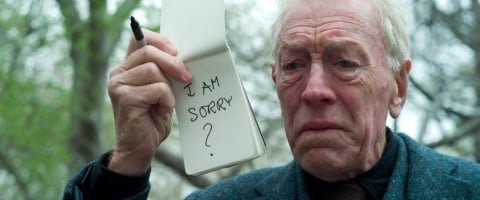For Your Consideration: Why Extremely Loud & Incredibly Close Deserves Best Picture

Every weekday from now until the Oscar ceremony we'll be running a For Your Consideration piece on behalf of every Best Picture nominee, arguing why it deserves its nomination or even a win, arguing why it's important, or even pointing out why it doesn't belong at the Oscars at all. Here is Sean with a personal argument on behalf of Extremely Loud & Incredibly Close.
If you claimed to be shocked by Extremely Loud and Incredibly Close’s Best Picture nomination – and several angry posters took to Twitter and Facebook to beat that drum – then you don’t know the Academy.
The only thing that truly surprised me about EL&IC on Oscar-nomination morning is that its director, Stephen Daldry, was left out of the Best Director category for the first time in his career. Process this bit if trivia, because it’s truly remarkable. Daldry has directed four feature-length films since 2000. All four have been nominated for Best Picture. And prior to EL&IC, Daldry had received Director nominations, as well.
Were they all deserved? I can’t make that argument. Billy Elliot remains Daldry’s most uplifting film, though it’s my opinion that EL&IC is superior to The Hours and The Reader. It also is/was a Best Picture shoo-in for so many reasons that its detractors chose to overlook or stubbornly ignore. While not a 9/11 movie, it still hinges on events that took place on that monumental morning. It’s centered around an emotionally damaged (and mentally impaired) special-needs child. It stars two-time Oscar nominee Max Von Sydow, two-time Oscar nominee Viola Davis, Oscar winner Sandra Bullock, two-time Oscar winner Tom Hanks … basically, it was made by Academy royalty, populated with Academy veterans, and directly tailored to the Academy’s tastes in storytelling. And people pretended to be shocked that it made the cut?
Oh, and here’s the most important thing to note about EL&IC -- it’s tremendously moving, beautifully acted, mildly manipulative but enormously effective. But that’s where I tend to separate from the masses.

With a 45% Fresh grade on Rotten Tomatoes, EL&IC ranks as one of the lowest-rated Best Picture nominees in the site’s history. (The Top Critics on the site were kinder, but still, that number’s terrible.) And for a while, I tended to agree with the critics who criticized Thomas Horn’s precocious young character, Oskar, a nine-year-old who lost his father (Tom Hanks) when the World Trade Center collapsed.
I can tell you, though, the moment my opinion of Oskar – and, by extension, of EL&IC -- changed. It was Daldry’s shot of the young boy hiding under his bed and scratching, helplessly, at the floor with his index finger as he “coped” with the devastation of 9/11. They are the actions of a damaged child, and with that, my frustration and anger aimed at Oskar melted away into sympathy. I understood Hanks’ need to consistently stimulate his son (who, we later learn, has Asperger’s) with mental challenges. And I caught Bullock’s line about how important Hanks’ character is to their family equation because without him, Oskar won’t grow up to be a man who can contribute to society. Maybe it’s because I’m a parent, and I comprehend the fears, triumphs, concerns and challenges that fly at fellow moms and dads on a daily basis. But with the realization that Oskar had a quantifiable mental illness, EL&IC became a different movie. A better movie. And yes, an Oscar-worthy movie.
CINEMABLEND NEWSLETTER
Your Daily Blend of Entertainment News
Listen, I’d nominate EL&IC for Horn and Bullock’s performances alone. I’m not sure any of the five men nominated for Best Actor give as textured and lived-in performance as Horn delivers in Oskar. He embodies the complicated boy’s grating quirks. Yet since we don’t know if this former Jeopardy! champion is actually like this or not, it’s very hard to see where the performance ends and the actor starts. Doesn’t matter. For this part, Horn is perfect, and his EL&IC turn is fantastic. Bullock, meanwhile, gets one great scene near the end of Daldry’s film, and she points toward the left-field bleachers, leans back, and knocks it out of the ballpark.
In their hands, Daldry unlocks the heart of EL&IC, exploring how a family overcomes the loss of a key member and, in time, figures out how best to move forward when your “team” is down a crucial player. Those who scream that Daldry’s film shamelessly mines the Sept. 11 terrorist attacks don’t have a leg to stand on. The director barely shows the burning towers, and when we do see them, it’s from the perspective of Bullock’s character, who has good reason to look in the direction of the flames at that moment. Oddly enough, you could tell a very similar story of a boy with Asperger’s mourning the loss of his interactive parent using most of the same beats and losing very little of the impact if, say, the dad died in a car crash or dropped dead of a heart attack. The emotions felt by the various characters would ring as true. But that’s not Jonathan Safran Foer's novel, and Daldry and Eric Roth would have asked for a browbeating had they deviated away from the significant elements of the source material. As I contemplated EL&IC in the days and weeks after an initial screening, I wondered how many men and women who lost their lives on that horrific day left behind a special needs child? And how did those children deal with the loss? Was it similar to EL&IC?

Daldry’s film isn’t perfect. Precious few Oscar-nominated films are (though Moneyball comes close). Horn’s character is wrong for withholding the answering machine messages from his mother, and there’s no way Bullock wouldn’t sprint to the machine to see if her husband had called on that fateful morning. And when you unravel the logistics of Bullock’s various journey’s ahead of Oskar, it’s damn near impossible. But the emotions earned by EL&IC are so honest, so genuine, that nitpicking them seems inconsequential. It was never about the key that Oskar found in his father’s closet. It was about closure, and Bullock’s mother found it in her troubled son.
Will it win Best Picture? Probably not. This year, Michel Hazanavicius’ The Artist seems downright unstoppable. But if Daldry’s standing alongside EL&IC producer Scott Rudin at the end of the Oscar ceremony on Feb. 26, I wouldn’t be shocked.
For more arguments for and against this year's Oscar nominees, go right HERE.

Sean O’Connell is a journalist and CinemaBlend’s Managing Editor. Having been with the site since 2011, Sean interviewed myriad directors, actors and producers, and created ReelBlend, which he proudly cohosts with Jake Hamilton and Kevin McCarthy. And he's the author of RELEASE THE SNYDER CUT, the Spider-Man history book WITH GREAT POWER, and an upcoming book about Bruce Willis.
Most Popular






